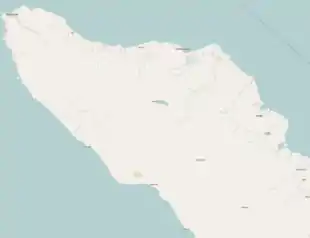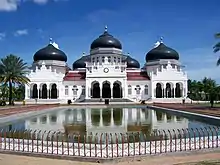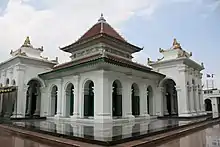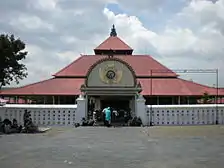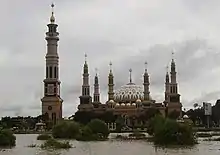Baiturrahim Mosque
Baiturrahim Mosque is a mosque located in Ulee Lheue, Meuraksa sub-district, Aceh Province, Indonesia. As a legacy of the Sultan of Aceh in the 17th Century, it is one of the historical mosques in Indonesia. Back then the mosque was named Jami Ulee Lheu Mosque. In 1873, when the Baiturrahman Grand Mosque was burned by the Dutch, all the worshipers held a Friday prayer at Ulee Lheue. Since then the name of the mosque became Baiturrahim Mosque.[1]
| Baiturrahim Mosque | |
|---|---|
 Outside View | |
| Religion | |
| Affiliation | Islam |
| Location | |
| Location | Ulee Lheue, Banda Aceh, Indonesia |
| Geographic coordinates | 5.555789°N 95.284188°E |
| Architecture | |
| Type | Mosque |
| Style | Moorish |
| Completed | 1922 |
Since its establishment, the mosque has been restored several times. Initially the building was completely made out of wood, with a simple shape and was located next to the location of the present mosque. Because it was made out of wood, building did not last long as weathering had torn the building down. In 1922 the mosque was re-built with long-lasting material by the Government of Dutch East Indies with European architectural style. But this construction did not use iron or bone braces, and built with bricks and cement only.[1]
In 1983, Banda Aceh was rocked by a devastating earthquake and it undermined the dome of the mosque. After that people rebuilt the mosque but they no longer installed the dome, thus replacing it with an ordinary roof. Ten years later, a massive renovation of the mosque was commenced, leaving the front part the only original part of the building. 60 percents of the remaining parts were renovated. Until today, the original part of the mosque still looks solid on the front.[1]
On December 26, 2004, an earthquake and subsequent tsunami leveled the entire buildings around the mosque, thus made Baiturrahim Mosque the only surviving structure in the area.[2] Condition of the part of the mosque which made of bricks only damaged about twenty percent, and the people of Aceh highly honored this mosque as a symbol of God's greatness.[1]
References
- Babak-Disaster-and-Trace-Aceh -The Mass of Baiturrahim Ulee Lheue Mosque, Two Rains of Disaster and the Trace of Aceh of Silam. Atjeh Post . Retrieved 23 July 2012
- Html Mosque of Baiturrahim, Ulee Lheue. www.antara-aceh.com Retrieved July 23, 2012
